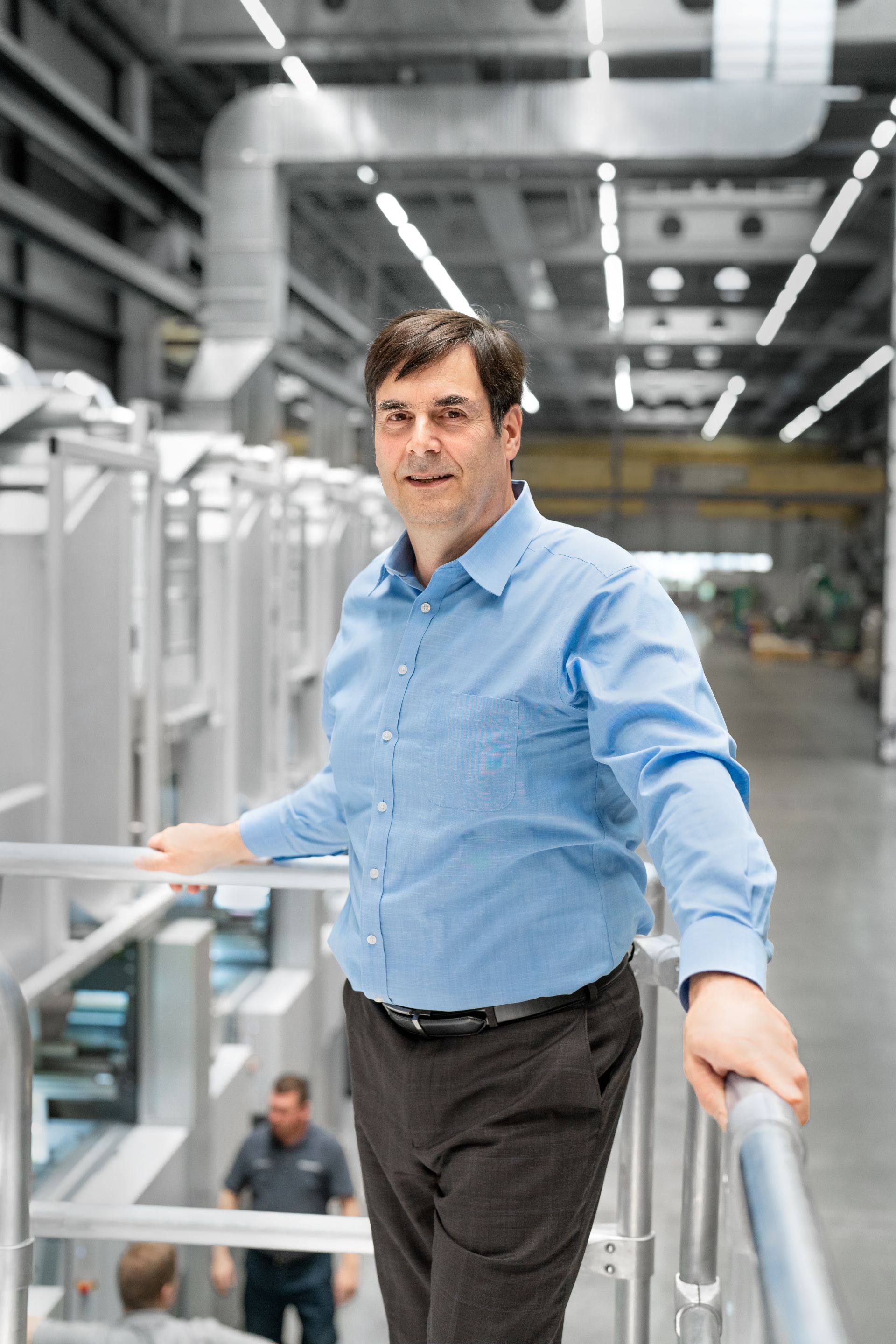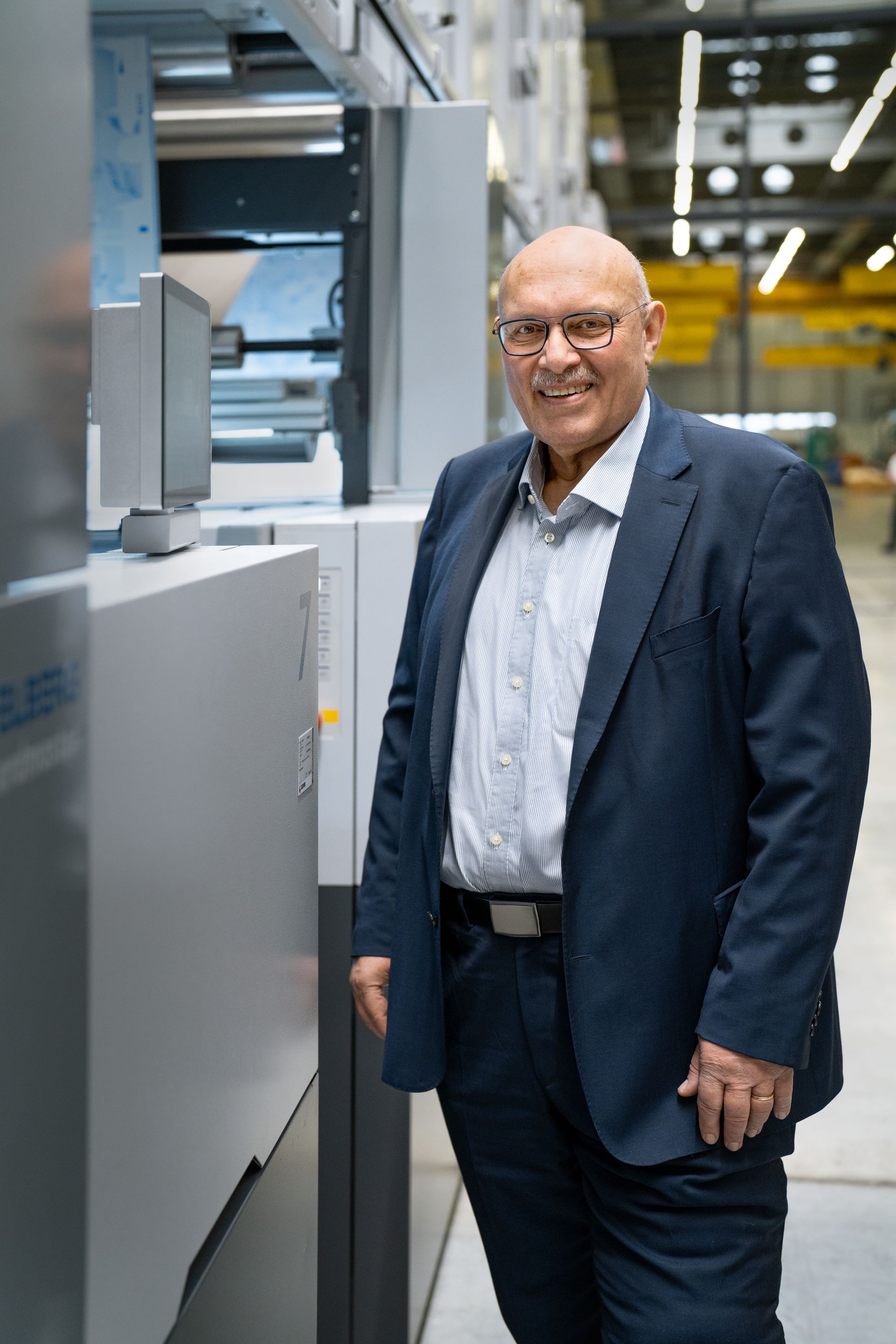Six paper rolls weighing several tons are waiting for their turn at the Print Media Center in Wiesloch. Together they provide 30 kilometers of printing material. It’s hard to imagine that the Boardmaster needs less than an hour to process this length. But as soon as the machine takes off, any doubt vanishes – at 600 meters per minute. But what is even more impressive is that the machine can print folding cartons for tea bags, soft drinks and other products one after the other without interruption when switching from one job to the next.

Felix Müller, Head of Heidelberg Web Carton Converting GmbH

Felix Müller, Head of Heidelberg Web Carton Converting GmbH since January 2024 and thus responsible for the Boardmaster and other products assembled in Weiden, stands in front of one of the printing units and explains the unique non-stop principle: “A flying job changeover can also be done with other machines – but they need operators who have to set everything manually to start up. Waste is almost unavoidable. The Boardmaster switches fully automatically from one faultless print to the next in a fraction of a second – with just a few meters of waste.”
To accomplish this, engineers came up with some new ideas: They installed two print decks in each print unit for quick changeovers. The Intellimatch printing plate scanner supplies the optimal presettings for the new job. It scans each printing plate with cameras and sends the data to the machine. The operators can focus on other tasks.
Next to Felix Müller is his predecessor Matthias Boog. Since officially retiring from HEIDELBERG, he has been working for the company in an advisory capacity. In typical Boardmaster fashion, the job handover between the two was seamless, but the two men took a little more time for the personal role change. “The transfer of knowledge is priceless. Matthias Boog developed the project with the team in Weiden from start to finish and knows the industry extremely well,” says Felix Müller.

Matthias Boog, former Head of Heidelberg Web Carton Converting GmbH

Boog used his knowledge of the industry in the run-up to development, when he and his team spoke intensively with printers, packaging manufacturers and other potential stakeholders in 2018. They came to the conclusion: “We needed a new solution that could meet four challenges: cost pressure, productivity, a shortage of skilled workers and sustainability,” says Matthias Boog.
Questions such as “Is the machine easy to assemble?”, “What does this mean for purchasing?” or “What does the sales department say?” provided continuous improvements. “At certain milestones, there were reality checks with customers and interested parties from the most important markets, including India, the USA, Europe and Dubai. Then came the assembly work in Weiden,” summarizes Matthias Boog. The prototype was ready in 2022, and in 2023 HEIDELBERG presented the machine at Interpack. The fully automatic line, which is currently set up in Wiesloch for demonstration purposes, is already planned for a US customer. The first prototypes are already running in the USA, and customers in Asia and Africa have placed orders.
Market expert Felix Müller, who took over from Matthias Boog in January 2024, can hardly remember a similar process in his 27 years at HEIDELBERG: “What’s been achieved in such a short time is extraordinary.” Müller is pleased about a related aspect when he thinks about the general struggle for young talent. “The fact that the Boardmaster team was very young by industry standards, with an average age of around 38, shows us that we can also inspire the next generation with innovative technologies.”
“We are right on target with the launch and the lines already sold,” says Felix Müller. And looking at the global data, Boardmaster seems to have come at the right time, as the global market for folding cartons is growing by an estimated 2.3 percent annually. The share of packaging produced using flexographic printing is also set to increase from 13.7 percent (2010) to 15.2 percent (2027). These are the findings of market studies by the PIRA, RISI and S&P Global Insights institutes. In regional terms, according to Felix Müller, there is strong potential in the USA, where flexographic printing is popular. “At the same time, there is a huge market there in the food and beverage sector, where we at HEIDELBERG already have a lot of experience. We want the Boardmaster to take advantage of this,” says Felix Müller.
As is usual in the printing business, the question of ideal utilization scenarios is a numbers game with job sizes. “What we kept in mind during development: Boardmaster is not a competitor to our Sheetfed 106 systems, it is intended to complement the portfolio. The Boardmaster has advantages with jobs that require larger formats and volumes.” The machine primarily reduces overall operating costs for the high-volume production of folding cartons.
The Boardmaster concept shows how cost-effectiveness and sustainability can go hand in hand. International brand groups in particular want high-quality and sustainable printing. The recyclability of their entire range of packaging is very important to them. Plastic bags that were previously used to package confectionery or other foodstuffs are gradually disappearing. They are being replaced by fiber-based materials, i.e. recyclable paper or cardboard, with an appropriate coating if necessary. Overall, fiber-based materials reduce CO2 consumption and pave the way for a circular economy. “We want to be a technological enabler for sustainable development in the packaging market. Appropriate modular coating units can be integrated into the machine at any time. Together with our own drying technology, they make it possible to use environmentally friendly barrier coatings, including water-based ones,” explains Felix Müller.
Asked about the current agenda for Boardmaster, Felix Müller quickly lists three items: software integration, service and maintenance offers. “We already have a 24/7 hotline. But the area is expanding. The goal is to provide our global service network with know-how about Boardmaster.” This will initially take place in markets such as the USA, where most of the machines sold are in operation. At the same time, we will use real customer data to continue optimizing service: “The workflow of operators in different industries and countries varies widely. We will continue to update software and further refine the machine. And always in close alignment with customer requirements.”